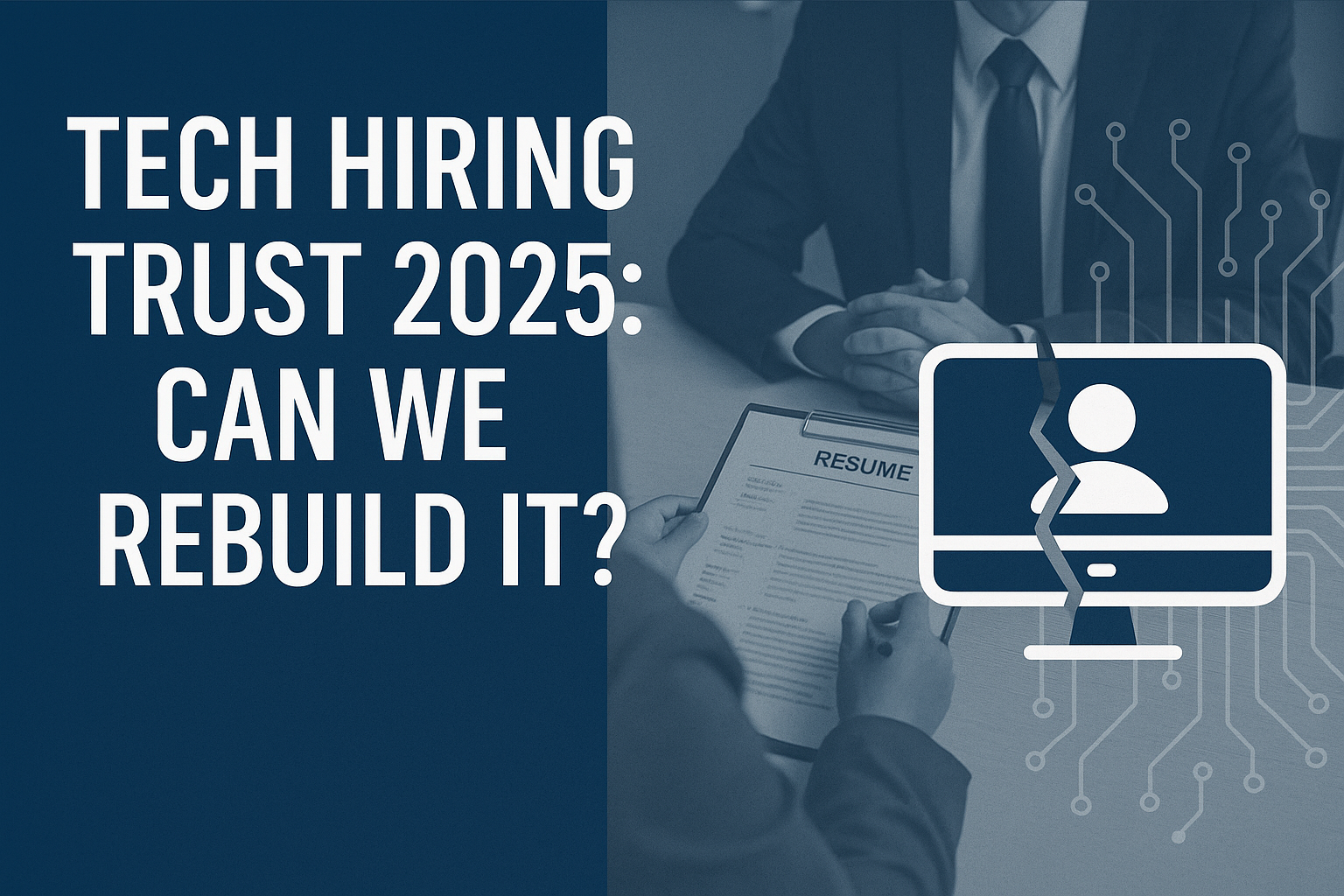Tech Hiring Trust 2025: Can We Rebuild It?
Tech hiring trust 2025 is at a breaking point. We were told that technology would eliminate bias, speed up recruiting, and create more opportunity. Instead, job seekers are ghosted, résumés vanish into black holes, and real human connection has been replaced by impersonal automation. In theory, AI promised a fair and efficient hiring revolution. In practice? It’s left many feeling more isolated, mistrusted, and dehumanized than ever.
The problem isn’t tech itself — it’s what we’ve asked it to do: cut costs, not build relationships. According to a Gallup study, only 34% of U.S. workers feel engaged, and a majority of job seekers feel disconnected from the companies they’re applying to. That trend continues in 2025, where even advanced HR systems prioritize automation over empathy. That’s starting to change, but not nearly fast enough.
The Trust Collapse in Hiring
Today, 75% of job seekers never hear back from employers. A typical online job posting receives 250 applications — only 2% of applicants are called for an interview, according to Zippia. Ghost jobs — listings posted with no intent to hire — contribute to the noise, increasing job seeker fatigue and distrust.
Meanwhile, companies complain of “talent shortages,” when in reality they’ve built black-hole application systems. Automation has filtered out thousands of qualified applicants simply for lacking specific keywords. The disconnect is systemic, and it’s damaging trust in the hiring process — not just for applicants, but for recruiters burned out by inefficient systems.
Interview App — A Local Signal of What’s Possible
In Kansas City, Chelsea Parker’s Interview App is pioneering a new approach. Built on a video-first platform, the app allows candidates to introduce themselves in short-form clips — highlighting communication skills, personality, and values that résumés can’t capture.
Founder, Chelsea Parker, calls the app “the TikTok of LinkedIn,” not just for its format but for its potential to flip hiring upside down. Instead of resume-first vetting, employers begin with the human. By partnering with local organizations like Black Excellence KC and the Heartland Black Chamber of Commerce, Interview App also ensures access beyond the tech elite.
It’s proving especially powerful for candidates displaced by government layoffs. In fact, many former public sector workers are using platforms like Interview App to relaunch careers in a volatile job market. Read how they’re adapting with new tools.
Other Human-Centered Tools — and Their Limits
- Willo – Offers asynchronous video interviews that make screening more flexible and authentic. Still, its interface often centers recruiter convenience over candidate experience.
- Pymetrics – Uses behavioral science and gamified tests to match job seekers based on potential. But according to Harvard Business Review, concerns over algorithmic bias and transparency still loom.
- Applied – Focuses on structured, anonymized hiring flows that reduce bias. Strong in government and nonprofit sectors, but limited uptake in corporate environments.
These platforms make progress, but none fundamentally shift the power imbalance. Recruiters still hold all the cards, and job seekers continue navigating systems that reduce them to scores or stats.
What Tech Should Be Doing to Rebuild Trust
- Transparency: Let candidates know where they stand. According to CNBC, ghosting by employers is at an all-time high — a key trust killer.
- Accountability: Platforms should show recruiter responsiveness metrics and let job seekers rate their experience — not just employers rating candidates.
- Dialogue: Build platforms that encourage authentic conversations — not just digital paperwork.
- Equity: Design hiring systems that serve all geographies, incomes, and levels of digital access — especially critical in an economy where job precarity is the norm.
In today’s fragile climate — what many now call the “eggshell economy” — these improvements aren’t optional. They’re urgent. Learn how HR leaders are navigating this unstable landscape.
Conclusion: Humanizing Tech Before It’s Too Late
Tech isn’t the enemy. But it’s not the hero either — not yet. Tools like Interview App prove that it’s possible to reconnect hiring with humanity. But most platforms still reward efficiency over empathy, and scale over substance.
As we look ahead, the most successful hiring tools won’t just find the “best” candidate faster — they’ll rebuild trust with every interaction. And for that, they need to start putting people, not just data, at the center of hiring again.

